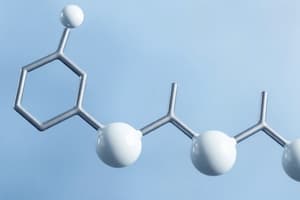Podcast
Questions and Answers
What is a unique aspect of organic molecules related to their stereochemistry?
What is a unique aspect of organic molecules related to their stereochemistry?
- Non-polar characteristics
- Ionic bonds
- Metallic bonds
- Stereogenic centers (correct)
Which type of reaction involves the displacement of a leaving group by a nucleophile in organic chemistry?
Which type of reaction involves the displacement of a leaving group by a nucleophile in organic chemistry?
- Oxidation reaction
- Addition reaction
- Nucleophilic substitution reaction (correct)
- Elimination reaction
How do organic bonds differ from ionic or metallic bonds regarding electrical conductivity?
How do organic bonds differ from ionic or metallic bonds regarding electrical conductivity?
- Ionic bonds have similar conductivity to organic bonds
- Metallic bonds are less polar than organic bonds
- Organic bonds are non-conductive (correct)
- Organic bonds are highly conductive
What is the consequence of having four different groups around a sp extsuperscript{3} hybridized carbon?
What is the consequence of having four different groups around a sp extsuperscript{3} hybridized carbon?
In organic chemistry, what role do solvents, catalysts, temperatures, and pressures play in reactions?
In organic chemistry, what role do solvents, catalysts, temperatures, and pressures play in reactions?
What contribution has organic chemistry made to pharmaceuticals, agricultural practices, and materials science?
What contribution has organic chemistry made to pharmaceuticals, agricultural practices, and materials science?
What makes organic chemistry unique compared to other branches of chemistry?
What makes organic chemistry unique compared to other branches of chemistry?
Why is carbon considered the foundation of organic chemistry?
Why is carbon considered the foundation of organic chemistry?
What is a key feature that sets organic molecules apart from inorganic molecules?
What is a key feature that sets organic molecules apart from inorganic molecules?
What type of reactions do organic chemists frequently deal with?
What type of reactions do organic chemists frequently deal with?
Why are organic compounds significant and intriguing?
Why are organic compounds significant and intriguing?
How does carbon's valence electron configuration contribute to its role in organic chemistry?
How does carbon's valence electron configuration contribute to its role in organic chemistry?
Flashcards are hidden until you start studying
Study Notes
Introduction to Organic Chemistry
Organic chemistry is a vibrant field within the broader discipline of chemistry that examines carbon-containing compounds, particularly those found in living organisms. It's often referred to as the chemistry of life due to its strong connections with biological systems. Let's delve into some basic concepts about this fascinating area of study.
Carbon as the Foundation
Central to organic chemistry is the versatile element called carbon. With four valence electrons, it can establish covalent bonds with itself and other elements—most notably hydrogen, oxygen, nitrogen, sulfur, phosphorus, and halogens like chlorine and bromine. This ability to bond leads to the vast array of structures possible among organic molecules, which provides both their significance and intrigue.
Organic chemists work with complex molecules such as glucose, proteins, fats, amino acids, steroids, antibiotics, and many more naturally occurring compounds essential to life processes. These molecules typically contain hydrocarbon chains and functional groups derived from hydrogen, oxygen, or other non-metal atoms.
Types of Reactions & Bond Breaking
In contrast to inorganic reactions, which generally involve metal ions, organic reactions frequently involve breaking existing chemical bonds between carbon and another atom, forming new ones instead. Some common types of organic reactions include substitution, addition, elimination, oxidation, reduction, and condensation reactions. An example of such a reaction would be the nucleophilic substitution mechanism, where a nucleophile attacks the electrophilic carbon center, leading to displacement of a leaving group.
Unlike ionic or metallic bonds, organic bonds between atoms do not conduct electricity and are comparatively less polar, requiring different techniques and conditions during synthesis. To facilitate these reactions, skilled organic chemists employ various solvents, catalysts, temperatures, and pressures.
Stereochemistry & Chirality
One unique aspect of organic molecules is stereoisomerism, defined by the existence of two or more compounds that share identical molecular formulas and connections but differ only in spatial arrangement. This concept of three-dimensional structure arises because each carbon bearing four distinct groups (sp({}^{3}) hybridized carbons) has four different environments around it. Two examples, enantiomers and diastereomers, result from this phenomenon. A consequence of this complexity is that optically active components may exist in our environment, giving rise to the biologically relevant properties of certain drugs, pesticides, fragrances, and flavors.
Throughout history, organic chemistry has evolved alongside humanity's understanding of life and health, making significant contributions towards pharmaceuticals, agricultural practices, materials science, energy production, petrochemical industries, and environmental issues. As we continue to uncover and unlock the mysteries underlying organic matter, the possibilities remain endless.
Studying That Suits You
Use AI to generate personalized quizzes and flashcards to suit your learning preferences.




